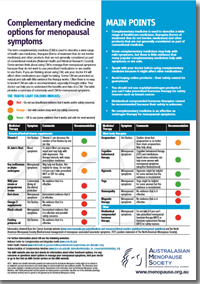Complementary medicine options for menopausal symptoms

MAIN POINTS
- Complementary medicine is used to describe a wide range of healthcare medicines, therapies (forms of treatment that do not involve medicines) and other products that are not generally considered as part of conventional medicine.
- Some complementary medicines may help with mild symptoms, but there is little evidence that many popular complementary medicines help with symptoms or are safe.
- Speak with your doctor before using complementary medicine because it might affect other medications.
- Avoid buying online products – their safety cannot be guaranteed.
- You should not use soy/phytoestrogen products if you can’t take prescribed hormone therapy for safety reasons such as breast cancer.
- Bioidentical compounded hormone therapy cannot be recommended because their safety is unknown.
- No complementary medicine is as effective as oestrogen therapy for menopausal symptoms.
Download:
Colour version ![]() AMS Complementary medicine options for menopausal symptoms84.7 KB
AMS Complementary medicine options for menopausal symptoms84.7 KB
Black and white print version ![]() AMS Complementary medicine options for menopausal symptoms BW85.2 KB
AMS Complementary medicine options for menopausal symptoms BW85.2 KB
The term complementary medicine (CM) is used to describe a wide range of healthcare medicines, therapies (forms of treatment that do not involve medicines) and other products that are not generally considered as part of conventional medicine (National Health and Medical Research Council). Some women think about using CM to manage their menopausal symptoms because they do not want to use prescribed medications or are unable to use them. If you are thinking about using CM, ask your doctor if it will affect other medications you might be taking. Some CM are promoted as natural and safe with little evidence the therapy works. Often there is no way to know if CM are safe or uncontaminated, especially if bought online. Your doctor can help you to understand the benefits and risks of a CM. The table provides a summary of commonly used CM for menopausal symptoms.
The traffic light colours indicate:
![]() Red - Do not use (insufficient evidence that it works and/or safety concerns)
Red - Do not use (insufficient evidence that it works and/or safety concerns)
![]() Orange - Use with caution (may work but safety concerns)
Orange - Use with caution (may work but safety concerns)
![]() Green - OK to use (some evidence that it works and safe for most women)
Green - OK to use (some evidence that it works and safe for most women)
|
Medicine/Therapy |
Symptom |
Comments |
|
|
Botanical/herbal/Vitamin supplements |
|||
|
Vitamin E |
Hot flushes |
Vitamin E can decrease the number of hot flushes by one per day. |
|
|
St John’s Wort |
Mood symptoms |
St John’s Wort can improve mood and may help with mild depression. This therapy interacts with many prescription medicines. |
|
|
Soy isoflavones or phyto-oestrogens |
Menopausal symptoms |
May help hot flushes. Not helpful for sleep. Do not take it if you can’t take prescribed MHT or HRT for safety reasons. |
|
|
Wild yam cream or progesterone cream |
Endometrial (lining of the uterus) protection |
No evidence that it is effective. |
|
|
Red clover |
Menopausal symptoms |
Inconsistent evidence that it is effective. |
|
|
Omega-3 supplements |
Hot flushes |
No evidence that it is effective. |
|
|
Black cohosh |
Menopausal symptoms |
Inconsistent evidence that it is effective and possible safety concerns. |
|
|
Evening primrose oil |
Hot flushes |
No evidence that it is effective. |
|
|
Mind-body therapies |
|||
|
Acupuncture |
Hot flushes |
Studies show that acupuncture is no better than sham acupuncture. May help sleep. |
|
|
Cognitive behavioural therapy |
Menopausal symptoms |
Cognitive behavioural therapy (CBT) and mindfulness-based stress reduction can help some women with menopausal symptoms (sleep/hot flushes/mood). |
|
|
Hypnosis |
Menopausal symptoms |
Hypnosis might be helpful for some women but the evidence is inconsistent. |
|
|
Yoga |
Menopausal symptoms |
Yoga might be helpful for some women but the evidence is inconsistent. |
|
|
Homeopathy |
Menopausal symptoms |
No evidence that is it effective. |
|
|
Magnetic therapy |
Menopausal symptoms |
No evidence that is it effective |
|
|
Other |
|||
|
Bioidentical compounded hormone therapy |
Menopausal symptoms |
Do not take it if you can’t take prescribed menopausal hormone therapy (MHT) or hormone replacement therapy (HRT) for safety reasons. |
|
Information obtained from the Cancer Australia website and the North American Menopause Society (Nonhormonal management of menopause-associated vasomotor symptoms: 2015 position statement of The North American Menopause Society).
For further information about CM see the following websites:
- National Center for Complementary and Integrative Health (www.nccih.nih.gov)
- Better Health Channel (www.betterhealth.vic.gov.au/conditionsandtreatment/complementary-and-alternative-care)
- National Institute of Complementary Medicine (www.nicm.edu.au/health_information/therapeutic_outlines)
The AMS website also has fact sheets for information about other treatment options. For any concerns or questions about options to manage your menopausal symptoms, visit your doctor or go to the Find an AMS Member service on the AMS website.

Note: Medical and scientific information provided and endorsed by the Australasian Menopause Society might not be relevant to an individual’s personal circumstances and should always be discussed with their own healthcare provider. This Information Sheet may contain copyright or otherwise protected material. Reproduction of this Information Sheet by Australasian Menopause Society Members, other health professionals and their patients for clinical practice is permissible. Any other use of this information (hardcopy and electronic versions) must be agreed to and approved by the Australasian Menopause Society.
Content updated January 2018
